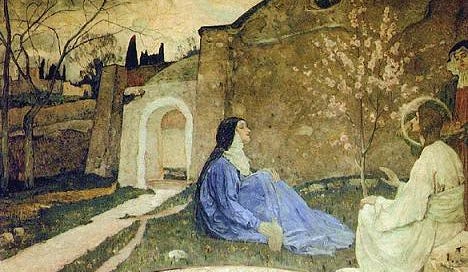Synopsis of Tonight’s Discussion on The Evergetinos Volume II Hypothesis XXIX Sections K and L:
Tonight‘s group consisted mostly of a monologue (out of necessity) about how it is that we are to read the Fathers. We have learned over these few years that one must read in a discerning and discriminating fashion, as well as prayerfully. There is great wisdom to be found within the ascetical writings, however, we must understand that the spiritual life and the personal struggle of each of the desert monks was unique. Furthermore, the desert itself was a laboratory like no other. In the deep solitude, the fathers saw with great clarity the workings of the human mind and heart as well as temptations that came from within and through demonic provocation.
If there is one point that I wanted to make clear in pressing through this with the group is that our love of virtue, of God and our desire to be free of the passions can lead us not only into extremes of discipline but also into a kind of psychological violence. The sorrow over our own poverty and sin can lead us to repress certain parts of our personality and aspects of our life as human beings that are a source vitality and the capacity to love. We have often spoken about desire being at the heart of the spiritual life; we seek He alone who can fill what is lacking within us. Yet when the ascetic life is treated like a defense mechanism, we can project our struggles and responsibility for ourselves onto others or, in the intensity of the struggle, repress that which is essential to being fully human. This is not an ancient phenomenon. Those who engage in the spiritual battle today can be tempted in similar ways. Each generation is unique in regards to the nature of the battle but the same pitfalls remain.
It is for this reason that the ascetical life cannot be seen as an end in itself. It must begin with Christ, our relationship with him and our trust in his mercy and grace. Devoid of this relationship, the ascetic life can draw us into self focus that is destructive to us both emotionally and spiritually. Thus, our reading of the fathers places upon us a responsibility to be striving at the same time to draw close to Christ. Otherwise, the spiritual life can become a tragic distortion of the truth rather than the source of healing that it is meant to be. The current state of affairs within the life of the Church and the disconnect with this greater spiritual tradition points to such a distortion. When Christianity becomes a cultural phenomenon and whenever even its deepest and most beautiful forms of prayer become habitual and automatic, it becomes lifeless. Let us take heed then of this great responsibility and entrust ourselves to the grace of God and the guidance of the Holy Spirit. All things are possible with God, but without him there is only darkness or a sad simulation of faith.




This podcast would have been a great stand-alone talk in several ways.
It can be discouraging when reading spiritual writers from modern times all the way back to ancient, all lamenting that there are no experienced elders! 😬 True, we have the voice of the Fathers in English, especially in this blessed time, but as far as bringing it down to personalizing it to one’s own spiritual life, are there not inherent dangers without having your own director?